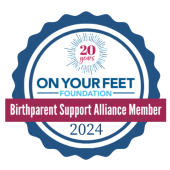Things to prepare for when sharing your plans to adopt

When a woman is expecting a baby, she’ll inevitably have to tell the world that she’s pregnant — sooner or later. But when a couple chooses to adopt, the decision of when — and how — to break the news is more complicated, given that adoption can be a long, drawn-out process filled with uncertainty, and a couple’s “due date” is not always set in stone. What’s more, many people seem to have an opinion or some preconceived notions about what it means to adopt, and are not afraid to voice those sentiments upon hearing a couple’s news. The following are a few strategies to keep in mind when telling the world about your pending adoption — and some reactions you might receive.
1. Decide whom you want to tell — and when. Once you’ve begun the adoption process, it can drag on for months or even years. Having the support of family, friends, and colleagues during this exciting and anxiety-provoking time can be a comfort. Some prospective parents choose to tell their closest friends and relatives about their decision early on. Others prefer to wait until the later stages of the process (for instance, once they’ve received their referral for a child or a birth mother’s due date is near), or until they’re more certain of the outcome. Of course, there are ultimately no right or wrong answers about whether or when to tell people. The choice is a personal one that will depend on your circumstances, the details of the adoption, and your relationships with those around you.
2. Get ready for questions. Once you do break the news, be prepared for an onslaught of questions. Since many people are still in the dark about the emotional and practical aspects of adoption, they may ask you things that seem impertinent or rude: “Don’t you want ‘your own’ child?” “How much are you paying for your baby?” “What if the birth mother changes her mind?” (Of course, you’ll also be grilled on “When is the baby coming?” “Have you chosen a name yet?” “Have you gotten the room ready?”)
Try not to take these questions personally. Most people are simply curious about the adoption process, and this can be a good opportunity to educate them. As with any family matter, though, don’t feel as if you have to answer questions that are too intrusive or personal, or that compromise the privacy of the birth mother or your adoptive child.
3. Be prepared to debunk myths. While some people may ask questions based on their lack of knowledge about adoption, others may think they have all the answers because of something they’ve read, seen on TV, or heard from a friend. For instance, a relative or coworker may say, “I’ve heard that all Russian (Chinese, Guatemalan, etc.) orphanages are terrible and that all the babies there are sick or developmentally delayed,” or “You’re such a saint to adopt a foster child. I’ve read that all foster kids have major problems.” Again, this is a good opportunity to set the record straight about certain issues of adoption, and to draw the line when you feel a question or comment is too nosy, rude, or personal.
4. Give adoptive grandparents a chance to vent — and to comprehend. Even the most eager grandparents-to-be may need time to get used to the idea of having a grandchild who doesn’t look like them or who, in some cases, is of a different race. They may need to grieve that the family’s bloodline is not being continued, or they may worry that an adoption might fail or turn out badly. Grandparents and family members, like anyone else, may also need to confront their own lack of knowledge and prejudices about adoption, and it will be up to you to help them.
To start, you could invite your parents and other close relatives to join you at a meeting of an adoptive parents’ group, give them a subscription to an adoption newsletter or magazine, recommend a few books on the subject, or have them speak with other adoptive grandparents by phone. Chances are, your parents and relatives will want to fully embrace your decision — and your child. But they may need some time and information before they can fully do so.
Sources: The Adoption Resource Book by Lois Gilman, The Complete Idiot’s Guide to Adoption by Chris Adamec; olderchildadoption.com
All content here, including advice from doctors and other health professionals, should be considered as opinion only. Always seek the direct advice of your own doctor in connection with any questions or issues you may have regarding your own health or the health of others.
American Baby
- By Laura Broadwell
Click Here for the original source





